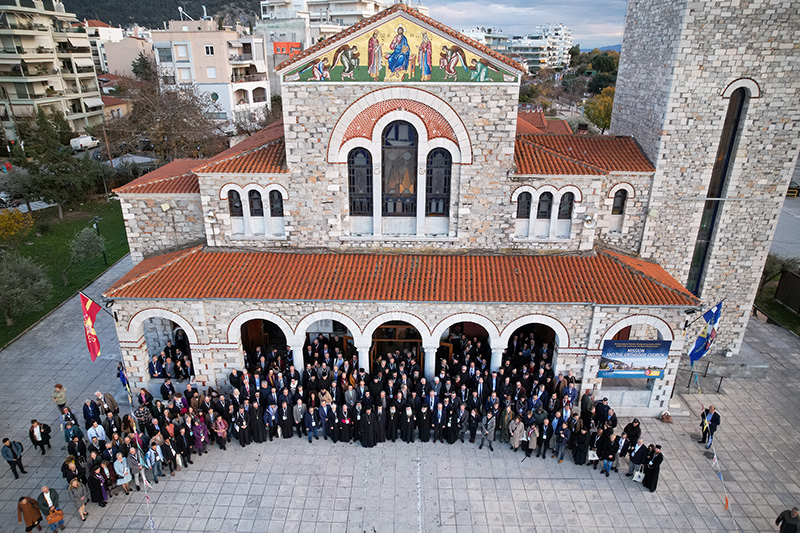Many see the Russian church’s support for the war in Ukraine as an unfortunate outcome of ethno-phyletism, expressed as a “Russian World” ideology. Russian President Vladimir Putin and Patriarch Kirill of the Moscow Patriarchate have often invoked this ideology, which says that a transnational Russian sphere of influence called Holy Russia has a common political center, spiritual center, language, church and patriarch that co-labor with the national leader to govern and uphold morality and culture.

Attendees of the Mega-Conference of the International Orthodox Theological Association meeting pose together in Volos, Greece. Photo courtesy of IOTA
But the effects of Orthodox fragmentation can be seen not only in Ukraine but also every Orthodox jurisdiction, some conference participants say, from Western Europe and the U.S. to Africa and East Asia. On Thursday, Gavrilyuk led a prayer for victims of war in Syria, Afghanistan and Ethiopia, where fragile peace has recently ended a civil war along ethnic lines with Oriental Orthodox Christians on each side. He said the Orthodox Church must be more than “an ethnic club.”
Of particular concern to critics of the members is the establishment of Russian churches in regions where other branches of Orthodox Christianity already have a foothold, such as Ambrosios’ jurisdiction in Korea, where a canonical order states that only one bishop should serve all languages and ethnicities.
The Moscow Patriarchate has also been rapidly expanding across Africa, stepping on the Patriarchate of Alexandria, which, since the Council of Nicaea in 325 A.D., has operated on a decree of territorial sovereignty over North Africa. The Russian church declared Alexandria to be in schism after its patriarch recognized the independence of the Orthodox Church of Ukraine, granted by the Ecumenical Patriarch Bartholomew I in 2019.
“The promising revival of Orthodoxy in the 20th century is being endangered by the serious problems that arose after the fall of communist regimes in so-called Orthodox countries which have sought to expand into other ecclesiastical jurisdictions,” Ambrosios said in his address.
In 2016, the Council of Crete condemned not just ethnic particularism but also a kind of nationalism that further restricts belonging and mutual acceptance. But such pronouncements have had little effect in the past: The Eastern Orthodox Church condemned ethno-phyletism as heresy at the 1872 Council of Constantinople, but only Greek-speaking church leaders were present, and the move was ignored in practice.
Still, Gavrilyuk is hopeful that the conference can lead to real reforms in the Orthodox Church. With the attendance in Volos of Russian Orthodox members and the sheer size of the meeting, he said, with the characteristic reserve of a churchman, “such a hope is not unsubstantiated.”
This article originally appeared here.











